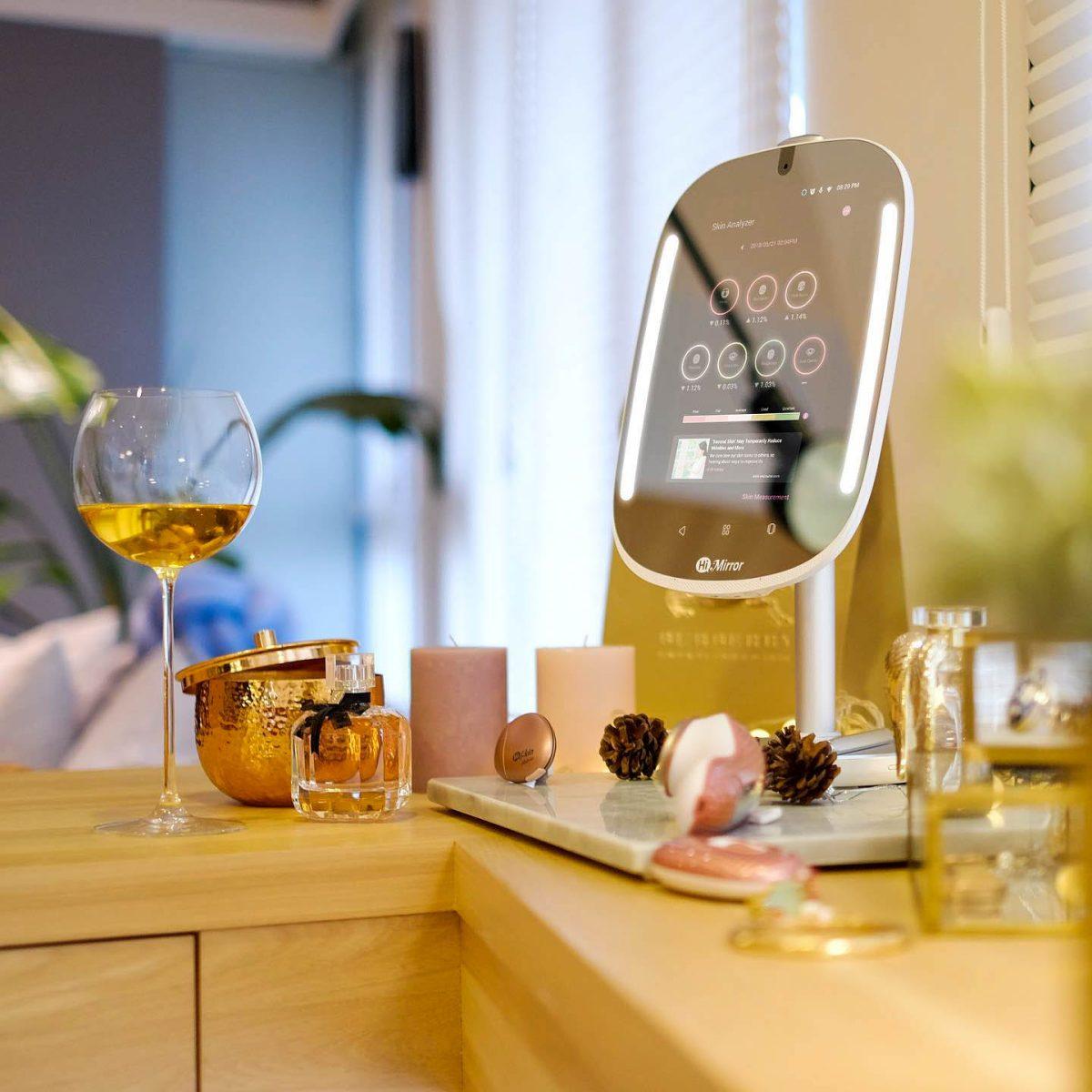For years I hated my skin and fought it violently via chemical warfare: retinols, acids and intense moisturizers were my weapon of choice. It wasn’t until I came down with Impetigo — a horrible skin infection — that I thought to stop and ask myself, “What exactly am I fighting for?”
The truth is, before my skincare Armageddon, my acne was mild to moderate at worst. In other words, I was a normal teenager dealing with normal teenage acne. But in a time where the soft, dewy, no-makeup look was hailed by all the most popular it-girls of Instagram and beyond, it was hard for me to see myself as anything but abnormal. I thought the perfect skincare routine must be out there; some product or treatment was the deus ex machina of skin troubles.
This is why, when a viral ad for the Himirror floated across my Twitter feed, my immediate thought was, “I would have loved something like that.”
The Himirror is an interactive intelligent mirror with a LED screen and built-in camera to function as an “at-home beauty consultant” capable of assessing your skin’s condition and recommending treatment. Some of its more miscellaneous features also include access to beauty tutorials on YouTube, a variety of atmospheric lighting settings, Amazon’s Alexa, Google Duo, Spotify and augmented reality technology (similar to that of a Snapchat filter) that allows you to “try-on” makeup looks virtually. In other words: welcome to the future.
Of course, what stood out to me the most about the Himirror was its apparent ability to compute metrics that related to particular skin issues such as redness, roughness, pores, dark spots and wrinkles. These same metrics are then recorded over time and compiled to report the effectiveness of each skincare product you use, and then new ones are recommended. It only took a few double-takes for me to become very suspicious of how all of this worked. What technology was being used to assess the skin’s appearance? How was each metric quantified? What third parties are entitled to that data?
Questions like these led me to do some digging about who or what was behind the Himirror’s creation. I discovered that Simon Shen, the CEO of a Taiwanese electronics company, was the inventor and founder of Himirror. Before his recent break into the beauty industry, Shen spent decades inventing a variety of consumer electronics and computer-related technologies. Beyond this, there isn’t much information to suggest Shen has experience in the world of beauty consulting or dermatology.
I was beginning to feel like the Himirror was less of a useful tool for measuring skin imperfections, and more like a pseudo-objective way of encouraging a kind of flaw-focused monomania among its users. I thought about my 15-year old-self and what something like this could have done to worsen my already shattered self-esteem. The product recommendation feature would likely only serve to fuel my chronic obsession with investing in new skincare routines.
And again, what would I be fighting for? A concept of beauty that is both impossible and non-existent by design.
Part of the Himirror’s genius is that it creates this self-reflexive cycle of consumption. This sort of thing, sinister as it is, is nothing new for the beauty industry. Despite a recent push for inclusivity and body-positivity, many markets would not be able to thrive were it not for their ability to create new insecurities among its consumers. Thus, the very definition of beauty must be ever-evolving, contradictory and reliant entirely on appearance. From this premise emerges a projection of beauty grounded in a hyperreality indistinguishable from fact. Beauty is never meant to be “achieved.” Rather, it is a perpetual horizon. The “path to beauty” is a never-ending one. An excerpt of the “about us” page on the Himirror’s website even reads “No longer is your mirror just a reflection of present reality,” and this has never been truer.
The Himirror is not dystopian in this ideological apparatus alone, however. A large part of what makes the product so jarring to me is the sheer amount of data that the device collects from its users. Knowing what we know about the capabilities of facial recognition technologies in China, it is clear that products like the Himirror are only going to become more and more ubiquitous in the near future. Personal data is an extremely lucrative commodity in what author Shoshana Zuboff calls “Surveillance Capitalism.” According to Zuboff, this state of market affairs “unilaterally claims human experience as free raw material for translation into behavioural data.” Effectively, your right to privacy is bypassed in servitude of predictive advertising. Products like the Himirror allow companies to “anticipate what you will do now, soon, and later.” In this way, our once personal choices and autonomy become usurped by capital. Personal necessity becomes indistinguishable from simulated necessity.
If all of this is starting to sound like a Black Mirror episode, that’s because it kind of is. So long as capital is allowed to rescind our rights to privacy in the name of economic extraction, the beauty industry will only utilize more and more invasive and harmful means of selling its products.
Dystopian beauty: the Himirror is a jarring look into the future of the beauty industry
January 27, 2020
Photo by via Facebook Page
The Himirror is a new technology in the beauty industry that combines skincare and facial recognition.
0
Donate to The Battalion
Your donation will support the student journalists of Texas A&M University - College Station. Your contribution will allow us to purchase equipment and cover our annual website hosting costs.









